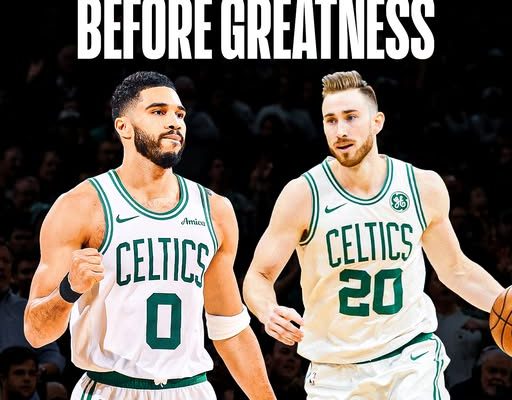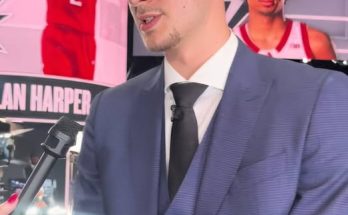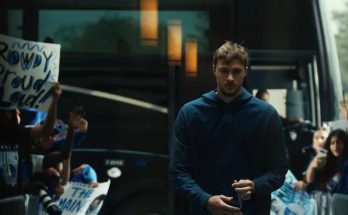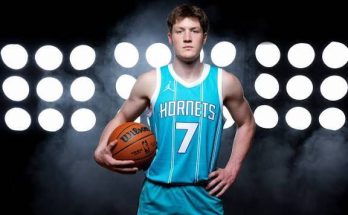Jayson Tatum Nearly Left the Celtics Before Stardom, but a Twist of fate — one rooted in patience, mentorship, and timing — changed everything. Now, he’s the face of the Boston Celtics, the leader of a championship-caliber team, and widely considered one of the top five players in the NBA. But that iconic rise, from a promising Duke product to perennial All-NBA selection, almost never happened in green and white. Behind Tatum’s ascension lies a story of uncertainty, frustration, and a nearly seismic shift that would’ve altered the franchise’s trajectory permanently.
In the summer following his rookie season, Tatum had just come off an incredible playoff run where he helped lead a Kyrie Irving-less Celtics squad to Game 7 of the Eastern Conference Finals. He dunked on LeBron James. He scored at will. He looked like the future. And yet, there was an internal unease both within Tatum and the Celtics organization. Boston, with a war chest of draft picks and assets, was still chasing the ghost of a second true superstar to pair with Irving, and even though Tatum had shown flashes of greatness, some in the front office wondered if he was untouchable in the right trade.
Trade rumors surrounding Anthony Davis were heating up, and the Celtics were major players. The Pelicans had made it known they would only entertain offers that started with Tatum. Boston, desperate to create a superteam to rival Golden State, seriously considered it. And on the other side of the equation, Tatum himself, despite his on-court success, felt unsure of his long-term place in Boston. The offense was often stagnant, he was playing third or fourth fiddle behind Irving and Al Horford, and Brad Stevens’ system, while structured, sometimes limited his creativity.
Tatum’s inner circle, including his father and his St. Louis mentor Larry Hughes, had conversations about what a fresh start somewhere else might look like. There were whispers that Tatum wouldn’t mind going back closer to home — a team like the Memphis Grizzlies had appeal. His love for Kobe Bryant and the Lakers also lingered in the background. In those days, before he was considered a franchise cornerstone, Tatum felt replaceable. And in fact, for a while, he almost was.
When Danny Ainge was reportedly inches away from pulling the trigger on a deal to send Tatum, Marcus Smart, and picks to New Orleans for Davis, only one thing stopped it: Davis’ camp, led by his father and Rich Paul, leaked that AD would never re-sign with Boston. That killed the momentum. The Celtics refused to trade their most promising young player for a one-year rental. And just like that, the window for Tatum to leave Boston slammed shut — not because Boston believed he was untouchable, but because the timeline didn’t match.
That pause became the fulcrum on which Tatum’s destiny turned. The following season, Irving left for Brooklyn, and suddenly Tatum had the green light. No longer a secondary option, he was now the centerpiece of the offense. His game blossomed. His midrange jumper became lethal. His footwork more polished. His leadership more visible. That very next season, he averaged over 23 points per game and earned his first All-Star nod. It was no longer about potential. It was reality.
Off the court, the Celtics doubled down on their belief in Tatum. They brought in veterans like Kemba Walker to help transition into the next era, but made it clear that Tatum was the face. Jaylen Brown was his running mate, but Tatum was “the guy.” He signed a max extension and bought into the city fully. The bond with the fan base strengthened. He began working out with Paul Pierce. He stayed connected to Kobe’s training regimen. And most importantly, he stayed in Boston — by choice.
Still, there were growing pains. The 2021 season was marred by COVID-related absences, roster inconsistencies, and coaching shifts. Tatum fought through it, dropping 60-point performances, carrying the Celtics through the Play-In Tournament, and showing flashes of what a fully unleashed version of him could be. That year, though disappointing on paper, confirmed one thing: Tatum wasn’t going anywhere.
The true leap came under Ime Udoka. A defensive-minded coach who held players accountable, Udoka challenged Tatum to become more than a scorer. He demanded leadership, resilience, and effort on both ends. Tatum responded. The Celtics started slow that year but finished strong, culminating in a trip to the 2022 NBA Finals. Though they fell to the Warriors, Tatum’s run — including a Game 6 masterpiece in Milwaukee — proved he belonged on the highest stage.
The next couple of years saw Tatum become an MVP candidate, a nightly 30-point threat, and a more complete player. Critics began pointing to his efficiency, his passing, and his improved defense. He was now mentoring younger players. He was taking charges. He was playing through injury. He was becoming what the Celtics had once hoped to find through a trade: a true superstar.
Ironically, the Celtics’ gamble to not trade Tatum became the best decision the franchise has made in the last two decades. While Davis did help the Lakers win a title in the bubble, the Celtics built a sustainable contender around Tatum, Brown, and a collection of smart roster decisions. Brad Stevens, now in the front office, crafted the roster to complement Tatum’s strengths: spacing, defensive versatility, and depth.
And for all the twists and turns, the near-trades, and the frustrations, Tatum never forgets how close it all came to falling apart. In interviews, he’s alluded to moments of doubt, times he felt overlooked, and the significance of loyalty. That narrative has now flipped. He’s one of the most loyal stars in the game. He wears Boston on his sleeve. He’s raising his son, Deuce, in the city. He’s building a legacy not just as a great Celtic — but as potentially the greatest of his generation to wear the green.
In 2024, Tatum led the Celtics to their 18th NBA Championship, passing the Lakers for the most in league history. He was named Finals MVP, silencing any remaining doubters and etching his name permanently in the rafters. The culmination of years of grind, doubt, and patience.
It’s easy to look back now and forget how fragile it all was — how close Tatum came to being just another name in the endless cycle of “what ifs.” But fate — or perhaps bad timing for the Pelicans — kept him in Boston. The rest is history still being written.



